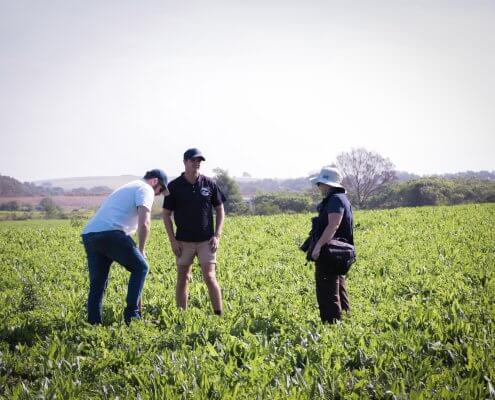It might be weird for someone in my position to be asking this question about data and technology. As a company that assesses sustainability and does research on farms, we are heavily reliant on good data, much of which is collected through technology, and communicated back to farmers using technology. I love data and lots of it! And I greatly appreciate the technology that has become integral to the modern farm. But I am now asking whether it has become a crutch? As in, farmers rely too heavily on the data and technology, and not enough on time spent in their pastures and with their animals.
The way I view it is that data should be a compliment to what is observed on the farm. Just having good data will not change or improve anything. Data needs to back up thoughtful approaches to solutions and implementation of best practices. It operates as a feedback loop of continual learning and process. Observation of the farm – soil, pastures, crops, and animals – gives a farmer insight, and then data re-enforces or challenges what is observed, which further informs management practices. There are two important aspects to explore: 1) the need for thought and 2) implementation of best practices.
When you start to observe your farm and understand the principles behind how things work it allows you to start thinking about solutions for your farm.
The need for thought
I enjoy working with farmers that want to learn why good practices are important, and that want to decide for themselves what is the best for their farm. I never want to work with farmers that don’t want the explanation but rather only want to be told what to do. I find those farmers are rarely in touch with their farm. The challenge is that it takes time, energy, and effort to be observant, to learn new ideas, concepts, and principles. This is why some farmers avoid it, and rather just stick to the safety of convention and what has been done in the past.
My encouragement to farmers is that it is well worth the effort. When you start to observe your farm and understand the principles behind how things work it allows you to start thinking about solutions for your farm. Further to this, you can start recognising how what you observe on the farm correlates with the data that is collected and reported on.
Sustainable, regenerative agriculture is founded on key principles, but the actual nuances of how to implement the best practices are context-specific – they differ from farm to farm. It is unrealistic to expect any consultant or advisor to be able to fully understand the circumstances of each farm they work on. The most successful farmers that I work with are the ones that use the insight that we provide, along with their own understanding of the principles and the knowledge of their farm so that we can together come up with the best practices and solutions for their farm.
Implementation of best practices
Once thoughtful, context-specific solutions and practices have been identified for a farm, the next challenge is to actually get the job done. It is one thing to have a nice strategy on paper, with good-looking maps and charts, but another thing to implement the strategies on the farm in a way that leads to success. This is where the best farmers separate themselves from the pack. The top farmers I work with are great at implementing the practices they have identified as being the best options for their farm.
Don’t let data be a crutch, use it as a tool
My encouragement to farmers is that they should view data and technology as a tool. It does not replace spending time among your cows or in your pastures. When used correctly as a tool, data and technology will provide valuable insight and assist in guiding a farmer to more sustainable solutions for their farm.
- A carbon footprint assessment for pasture-based dairy farming systems in South Africa - 2024-02-07
- What progress have farms participating with Trace & Save made over the past 10 years? - 2023-09-06
- Carbon footprint reduction over time: Lessons from pasture-based dairy farms in South Africa - 2023-09-04


